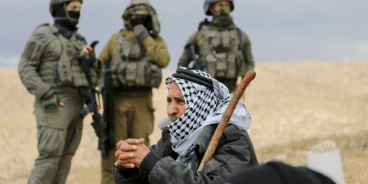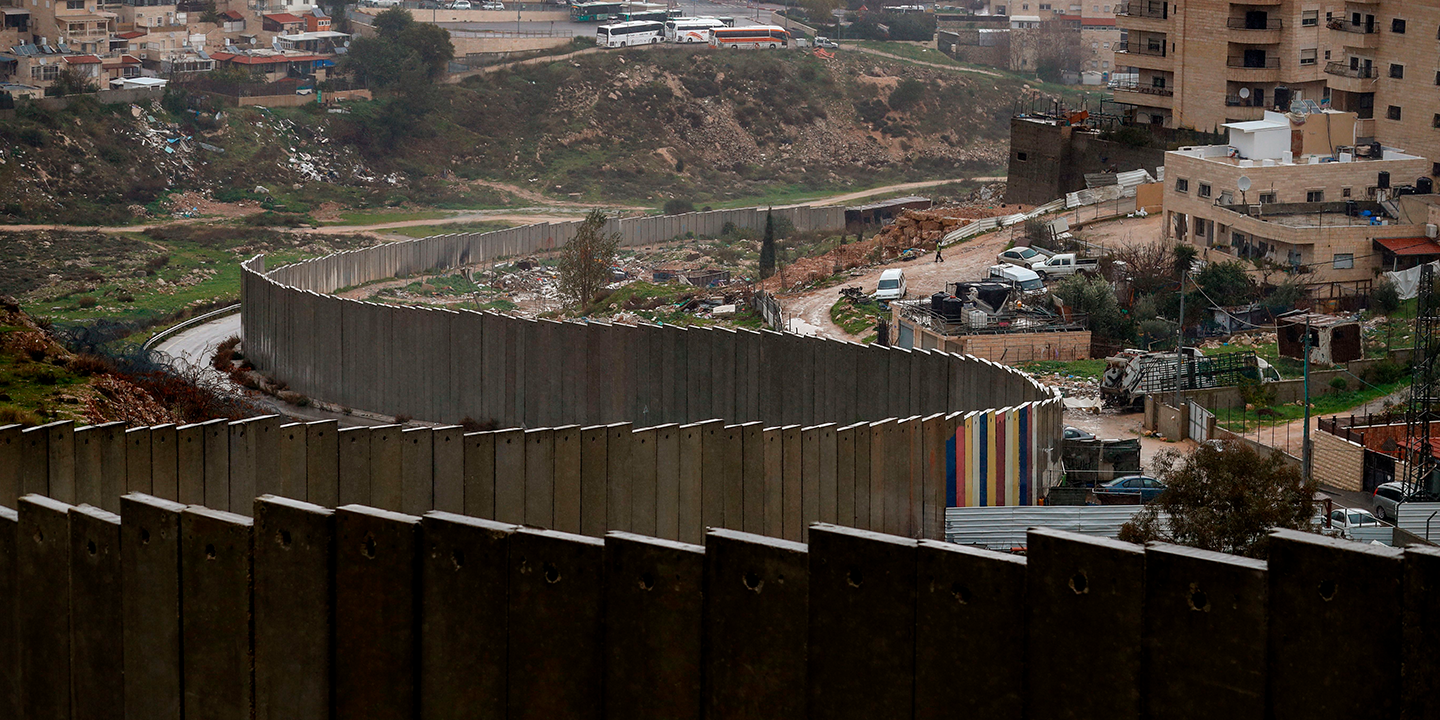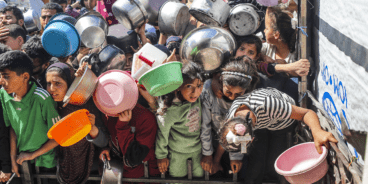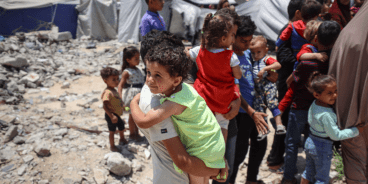

Atrocity Alert No. 294: Israel and the Occupied Palestinian Territory, Ukraine and Mali
Atrocity Alert is a weekly publication by the Global Centre for the Responsibility to Protect highlighting situations where populations are at risk of, or are enduring, mass atrocity crimes.
UN EXPERT CONCLUDES THAT THE SITUATION IN OCCUPIED PALESTINE “IS APARTHEID”
On 21 March the UN published a report by Michael Lynk, the Special Rapporteur for the situation of human rights in the Palestinian territories occupied since 1967, concluding that the international crime of apartheid is being practiced by Israel in the Occupied Palestinian Territory.
The Special Rapporteur provided detailed legal analysis applying amalgamated criteria from both the International Convention on the Suppression and Punishment of the Crime of Apartheid and the Rome Statute of the International Criminal Court to determine that Israel’s political system of entrenched rule satisfies the prevailing evidentiary standard for the existence of apartheid. The Special Rapporteur emphasized that, “a political regime which so intentionally and clearly prioritizes fundamental political, legal and social rights to one group over another within the same geographic unit on the basis of one’s racial-national-ethnic identity satisfies the international legal definition of apartheid.” Under the International Convention Against Apartheid and the Rome Statute, apartheid is a crime against humanity.
Special Rapporteur Lynk said, “living in the same geographic space, but separated by walls, checkpoints, roads and an entrenched military presence, are more than three million Palestinians, who are without rights, living under an oppressive rule of institutional discrimination and without a path to a genuine Palestinian state that the world has long promised is their right.”
The report determined that an institutionalized regime of systematic racial oppression and discrimination has been established, with the intent to maintain the domination of one group over the other. A dual legal and political system is in place, providing comprehensive rights and living conditions for Jewish Israeli settlers in the West Bank, including East Jerusalem, while imposing military rule and control on Palestinians without any basic protections or rights under international law. The report noted that the imposition of this system has been built upon the regular and widespread practice of inhumane acts, including extrajudicial killings, torture, denial of fundamental human rights, arbitrary detention and collective punishment. Additionally, Israel’s plans to expand Jewish settlements on occupied land requires the expropriation of Palestinian property. Last year Special Rapporteur Lynk concluded that illegal Israeli settlements amount to a war crime.
The Special Rapporteur’s report echoes similar findings by Palestinian, Israeli and international human rights organizations, including Addameer, Al Haq, B’Tselem, Human Rights Watch, and Amnesty International. Leading international figures, including former UN Secretary General Ban Ki-Moon, Archbishop Desmond Tutu, South African Foreign Minister Naledi Pandor and former Israeli Attorney General Michael Ben-Yair, have also labeled the situation as apartheid.
The international community should urgently heed the recommendations of the Special Rapporteur and implement a series of accountability measures in line with international legal principles to bring Israel’s 55-year occupation and apartheid practices to an end.
UN SAYS BOMBING OF UKRAINE’S CITIES MAY AMOUNT TO WAR CRIMES
Earlier today, 30 March, the UN High Commissioner for Human Rights, Michelle Bachelet, updated the UN Human Rights Council (HRC) on the situation in Ukraine, stating the shelling of Ukrainian cities may amount to war crimes. The High Commissioner lamented that civilian infrastructure has not been spared in the conflict, stating the people of Ukraine are enduring a “living nightmare,” with civilians in the encircled coastal city of Mariupol living in “sheer terror.”
The conflict has shown no sign of abating as civilian causalities continue to rise. On 28 March the Office of the UN High Commissioner for Human Rights (OHCHR) released a report on the human rights impact of the war in Ukraine, outlining abuses that were verified by the UN Human Rights Monitoring Mission in Ukraine (HRMMU). The HRMMU stated that Russian forces have widely used indiscriminate weapons in populated areas, including shelling from heavy artillery and multiple launch rocket systems, missiles, air strikes and cluster munitions. The report also highlighted allegations that Ukrainian forces have engaged in shelling of populated areas in territory controlled by Russian-backed separatists in the Donetsk and Luhansk regions.
Since the conflict began, OHCHR has verified 1,189 civilian deaths, including 108 children. However, the real toll is much higher. The HRMMU has faced access constraints to areas with large reported civilian casualties, including Mariupol, where an estimated 80 percent of residential buildings have been destroyed. According to the UN, over 4 million people have fled Ukraine to neighboring countries while over 6 million are internally displaced. Aid agencies have warned that an estimated 12 million people are trapped by fighting and are in need of assistance.
During an emergency special session on 24 March the UN General Assembly adopted a resolution deploring the humanitarian consequences of Russia’s hostilities in Ukraine. The resolution condemned the besiegement, shelling and air strikes against densely populated areas, as well as attacks striking civilians and civilian objects, particularly schools, water and sanitation systems, and medical facilities. The resolution demands an immediate cessation of hostilities, as well as ensuring access and safe passage for humanitarian workers.
Sarah Hunter, Communications and Digital Media Officer at the Global Centre for the Responsibility to Protect, said that, “while both Ukraine and Russia have eased their negotiation demands, until a cessation of hostilities is reached the international community must continue to increase diplomatic pressure, including by suspending Russia from the HRC.”
SURGE IN ATTACKS TARGETING CIVILIANS IN NORTHERN MALI
At least 335 civilians have been killed in the Ménaka region of northern Mali since heavy fighting broke out on 8 March between armed groups and the local faction of the so-called Islamic State. Clashes have recently intensified in various parts of Ménaka, including Tamalat, Inchinanane and Anderaboukane, between the Movement for the Salvation of Azawad – a largely Tuareg armed group – and its ally, the Imghad Tuareg and Allies Self-defense Group, and militants from the Islamic State.
The newly organized Islamic State Sahel Province – formerly known as the Islamic State in the Greater Sahara – has said that their offensive in Ménaka is against rival Tuareg fighters and not civilians. The hundreds of civilians killed are mostly from the Daoussak (or Dawsahak) ethnic group, a community close to the Tuareg. Videos circulating on social media have shown mass graves. The group has also allegedly kidnapped several dozen civilians, holding them hostage and imposing sharia law on populations. Homes and local markets have been destroyed and burned down. At least 8,000 people have been internally displaced and more than 9,000 have fled to Abala in Niger’s Tillabéri region.
Following a military coup in 2012, Tuareg separatists and Islamist armed groups seized territory in northern Mali, plunging the country into crisis. Despite international military presence, a UN peacekeeping force (MINUSMA), the signing of the 2015 peace agreement – the Algiers Accord –and further attempts at peace talks, insecurity has continued. Since 2015 violence has shifted from a separatist rebellion into inter-communal and extremist violence. The limited state capacity and presence in the north has enabled the expansion of the territorial control of Islamist armed groups, who are isolating villages and enforcing repressive policies based upon their interpretation of Islam.
According to a report released on 17 March by the UN Independent Expert on the situation of human rights in Mali, Islamist armed groups have perpetrated targeted killings, kidnappings, intimidation, imposition of illegal taxes, and other crimes with impunity. The Independent Expert also received reports of human rights abuses committed by signatories to the Algiers Accord, including killings, abductions and the recruitment and use of children in armed conflict.
Christine Caldera, Research Analyst at the Global Centre for the Responsibility to Protect, stated that, “all armed groups must immediately cease their attacks against civilians and civilian infrastructure. Security presence should be reinforced in areas vulnerable to attacks. With support from MINUSMA, the capacity of early warning mechanisms, such as the Communal Reconciliation Committees and Local Community Protection Committees, must be strengthened in the Ménaka region to ensure rapid and robust responses from all protection actors.”
Related Content


Gaza: Starvation or Gunfire - This is Not a Humanitarian Response
